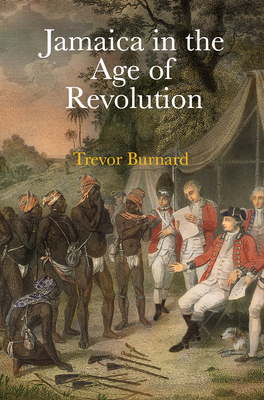

 University of Pennsylvania Press
University of Pennsylvania Press
Jamaica in the Age of Revolution


Key Metrics
- Trevor Burnard
- University of Pennsylvania Press
- Hardcover
- 9780812251920
- 9.4 X 6.4 X 1.2 inches
- 1.45 pounds
- History > Americas (North Central South West Indies)
- English
 Secure Transaction
Secure TransactionBook Description
A renowned historian offers novel perspectives on slavery and abolition in eighteenth-century Jamaica
Between the start of the Seven Years' War in 1756 and the onset of the French Revolution in 1789, Jamaica was the richest and most important colony in British America. White Jamaican slaveowners presided over a highly productive economic system, a precursor to the modern factory in its management of labor, its harvesting of resources, and its scale of capital investment and ouput. Planters, supported by a dynamic merchant class in Kingston, created a plantation system in which short-term profit maximization was the main aim. Their slave system worked because the planters who ran it were extremely powerful.
In Jamaica in the Age of Revolution, Trevor Burnard analyzes the men and women who gained so much from the labor of enslaved people in Jamaica to expose the ways in which power was wielded in a period when the powerful were unconstrained by custom, law, or, for the most part, public approbation or disapproval. Burnard finds that the unremitting war by the powerful against the poor and powerless, evident in the day-to-day struggles slaves had with masters, is a crucial context for grasping what enslaved people had to endure.
Examining such events as Tacky's Rebellion of 1760 (the largest slave revolt in the Caribbean before the Haitian Revolution), the Somerset decision of 1772, and the murder case of the Zong in 1783 in an Atlantic context, Burnard reveals Jamiaca to be a brutally effective and exploitative society that was highly adaptable to new economic and political circumstances, even when placed under great stress, as during the American Revolution. Jamaica in the Age of Revolution demonstrates the importance of Jamaican planters and merchants to British imperial thinking at a time when slavery was unchallenged.
Author Bio
Trevor Burnard is the Wilberforce Professor of Slavery and Emancipation at the University of Hull and the Director of the Wilberforce Institute. Between 2011 and 2019 he was Professor of American History and Head of School(2011-18) in the School of Historical and Philosophical Studies at the University of Melbourne, where he has been a faculty member since February 2011.
In addition to many articles, book chapters and edited books on the Caribbean and the Chesapeake, Trevor has written the following monographs. One was Creole Gentlemen: The Maryland Elite 1690-1776 (New York and London: Routledge, 2002) and a prize-winning study of a Jamaican slave overseer, Mastery, Tyranny, and Desire: Thomas Thistlewood and His Slaves in the Anglo-Jamaican World (Chapel Hill: University of North Carolina Press, 2004).
He has published a study of plantation societies in late seventeenth and eighteenth-century British North America and the West Indies in the American Beginnings Series called Planters, Merchants, and Slaves: Plantation Societies in British America, 1650-1820 (Chicago: University of Chicago Press, 2015). In June 2016, he published a co-authored comparative study of colonialism and slavery (with John Garrigus of University of Texas at Arlington) called The Plantation Machine: Atlantic Capitalism in French Saint-Domingue and British Jamaica (Philadelphia: University of Pennsylvania Press, 2016).
In 2020 he published two syntheses – The Atlantic in World History, 1492- 1830 (London: Bloomsbury) and Britain in the Wider World (London: Routledge) – and a monograph on mid to late eighteenth-century Jamaica, Jamaica in the Age of Revolution (Philadelphia: Pennsylvania). He has been the editor-in-chief of the Oxford Bibliography Online in Atlantic History since 2009.
Source: trevorburnard.com
Videos
No Videos
Community reviews
Write a ReviewNo Community reviews